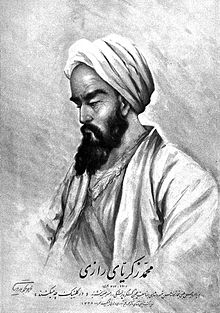Rasis
Abū Bakr Muhammad ibn Zakariyyā al-Rāzī (ابوبكر محمّد زکرياى رازى Abūbakr Mohammad-e Zakariyyā-ye Rāzī, an aa kent bi his Laitinised name Rhazes or Rasis) (854 CE – 925 CE), wis a Persie[3][4][5] polymath, physeecian, alchemist, filosofer, an important feegur in the history o medicine.
Abubak Mohammad-e Zakariyyā-ye Rāzī ابوبكر محمّد زکرياى رازى | |
|---|---|
 | |
| Born | 854 CE[1] Ray, Persie[2] |
| Dee'd | 932 or 925 CE[2] Ray, Persie (Iran) |
| Era | Islamic gowden age |
Main interests | Medicine, filosofie, alchemy |
Notable ideas | The first tae produce acids sic as sulfuric acid, writin up leemitit or extensive notes on diseases sic as smawpox an chickenpox, a pioneer in ophthalmology, author o the first beuk on pediatrics, makkin leadin contreibutions in inorganic an organic chemistry, an aa the author o several filosofical warks. |
References
eedit- ↑ Pathfinders: The Golden Age of Arabic Science (ISBN 978-1-84614-161-4)
- ↑ a b Iskandar, Albert (2006). "Al-Rāzī". Encyclopaedia of the history of science, technology, and medicine in non-western cultures (2nd ed.). Springer. pp. 155–156.
- ↑ Hitti, Philip K. (1977). History of the Arabs from the earliest times to the present (10th ed.). London: Macmillan. p. 365. ISBN 978-0-333-09871-4.
The most notable medical authors who followed the epoch of the great translators were Persian in nationality but Arab in language: 'Ali al-Tabari, al-Razi, 'Ali ibn-al-'Abbas al-Majusi and ibn-Sina.
|access-date=requires|url=(help) - ↑ Robinson, Victor (1944), The story of medicine, New York: New Home Library
- ↑ Porter, Dorothy (2005), Health, civilization, and the state: a history of public health from ancient to modern times, New York: Routledge (published 1999), p. 25, ISBN 0-415-20036-9